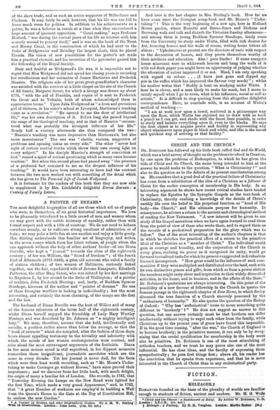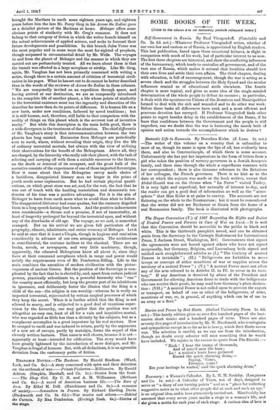FICTION.
KELEAGER.t
ROMANCES founded on the basis of the plurality of worlds are familist enough to students of fiction, ancient and modern. Mr. H. G. Welt.
• Christ and the Church : a Restatement of Belief. By Arthur W. Robinson, D..D. _Loudon S.P.C.K. pa. net.] t Mekager ; a Fantasy. Ms H. M. Vaughan. Landon: Martin Maker. LOW, brought the Martians to earth some eighteen years ago, and eighteen years before him the late Mr. Percy Greg in his Across the Zodiac gave us a detailed picture of the Martians at home. Meleager offers some obvious points of similarity with Mr. Greg's romance. It does not belong to that category of fiction in which the writer founds himself on the actual achievements of applied science, and seeks to forecast their future developments and possibilities. In this branch Jules Verne was the most popular and in some ways the most far-sighted of prophets, though surpassed in circumstantial detail by Mr. Wells. The voyages to and from the planet of Meleager and the manner in which they are carried out are perfunctorily treated. All we learn about them is that the transit was effected in a large aeroplane or airship. Like Mr. Greg, again, Mr. Vaughan has not been primarily concerned with writing a satire, though there is a certain amount of criticism of terrestrial civili- zation in his pages. What he has set out to do cannot be better described than in the words of the reviewer of Across the Zodiac in these columns. "We are composedly invited on an expedition through space, and having arrived at our destination, we are as composedly introduced to the complete life of another planet, a life whose points of similarity to the terrestrial existence must tax the ingenuity and discretion of the describer far more than do its points of difference. It is human life on a new basis, under new conditions, fathered by novel traditions; but it is still human, and, therefore, still liable to that comparison with the reality of things on this planet which is the severest test of inventive sanity." But while this description in the main holds good, there is a wide divergence in the treatment of the situation. The chief differentia of Mr. Vaughan's story is that intercommunication between the two planets has long existed. Emissaries from Meleager are periodically sent to earth, where, without revealing their origin, they live the life of ordinary terrestrial mortals, but always with the view of utilizing their observations for the benefit of the Meleagrians. Above all, they are charged, by the hierarchy who really rule their planet, with the task of selecting and carrying off with them a suitable successor to the throne, on the death or removal of its occupant, and the groat bulk of the narrative consists of the experiences of one of these imported Sovereigns. How it came about that the Meleagrian envoy made choice of a fastidious, disappointed literary man no longer in the prime of youth needs some explanation. But he had certain physical qualifi- cations, on which great store was set, and, for the rest, the fact that he was out of touch with the hustling materialism and democratic ten- dencies of his time was a positive advantage. For it is the aim of Meleager to learn from earth more what to avoid than what to follow. The disappointed litterateur had some qualms, but the emissary dispelled them in a long speech lasting four hours. And the positive inducements were considerable—a throne and a promise, if not of immortality, at least of longevity prolonged far beyond the terrestrial span, and without any of the drawbacks of old age. The voyage, as we said, is somewhat scamped. But on his arrival we are given full particulars of the geography, climate, inhabitants, and entire economy of Meleager. Let it be said at once that it is not a Utopia, though in hygiene and sanitation considerably in advance of our own arrangements. The architecture is semi-Oriental, the costume inclines to the classicaL There are no books, novels, or newspapers, and very little machinery, though, apparently, the educated Meleagrians know all about it, since they have at their command aeroplanes which in range and power would satisfy. tho requirements even of Mr. Pemberton-Billing. Life in the main combines the amenities of modern civilization with the pictur- esqueness of ancient Greece. But the position of the Sovereign is com- plicated by the fact that he is elected by, and, apart from certain judicial powers, practically subordinate to, a powerful hierarchy who " run " the country most efficiently, but keep the greater part of its inhabitants in ignorance, and deliberately foster the illusion that the King is a child of the sun—the religion is sun-worship—whereas he is really an imported terrestrial, rejuvenated by certain magical processes of which they keep the secret. When it is further added that the King is not allowed to marry, and is subjected to a good deal of vexatious super- vision by the hierarchy, one may gather that the position was not altogether an easy one, least of all for a vain and inquisitive mortal, who was regarded as little leas than a divinity by his subjects, but as a complacent accomplice in a great imposture by his real masters. How he escaped to earth and was induced to return, partly by the arguments of a new set of envoys, partly by nostalgia, forms the sequel of this cleverly written fantasia. That name is well chosen, because it is not— apparently at leastintended for edification. The story would have been gisatly lightened by the introduction of more dialogue, and Mr. Vaughan is frugal of humour. But, with all deductions, it is an agreeable deviation from the customary paths of fiction.































 Previous page
Previous page